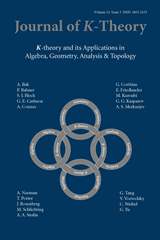Crossref Citations
This article has been cited by the following publications. This list is generated based on data provided by Crossref.
Steen, Johan
and
Stevenson, Greg
2015.
Strong generators in tensor triangulated categories.
Bulletin of the London Mathematical Society,
Vol. 47,
Issue. 4,
p.
607.
Baland, Shawn
and
Stevenson, Greg
2019.
Comparisons between singularity categories and relative stable categories of finite groups.
Journal of Pure and Applied Algebra,
Vol. 223,
Issue. 3,
p.
948.
Suzuki, Takashi
2020.
Grothendieck’s pairing on Néron component groups: Galois descent from the semistable case.
Kyoto Journal of Mathematics,
Vol. 60,
Issue. 2,
Balmer, Paul
2020.
Homological support of big objects in tensor-triangulated categories.
Journal de l’École polytechnique — Mathématiques,
Vol. 7,
Issue. ,
p.
1069.
Leslie, Spencer
and
Lonergan, Gus
2021.
Parity sheaves and Smith theory.
Journal für die reine und angewandte Mathematik (Crelles Journal),
Vol. 2021,
Issue. 777,
p.
49.
Zhang, Yaohua
2021.
Spectra of Tensor Triangulated Categories over a Category Algebra—A New Approach.
Applied Categorical Structures,
Vol. 29,
Issue. 6,
p.
1089.
Lau, Eike
2023.
The Balmer spectrum of certain Deligne–Mumford stacks.
Compositio Mathematica,
Vol. 159,
Issue. 6,
p.
1314.
Naumann, Niko
and
Pol, Luca
2024.
Separable commutative algebras and Galois theory in stable homotopy theories.
Advances in Mathematics,
Vol. 449,
Issue. ,
p.
109736.
Benson, David John
Iyengar, Srikanth B.
Krause, Henning
and
Pevtsova, Julia
2024.
Fibrewise stratification of group representations.
Annals of Representation Theory,
Vol. 1,
Issue. 1,
p.
97.

